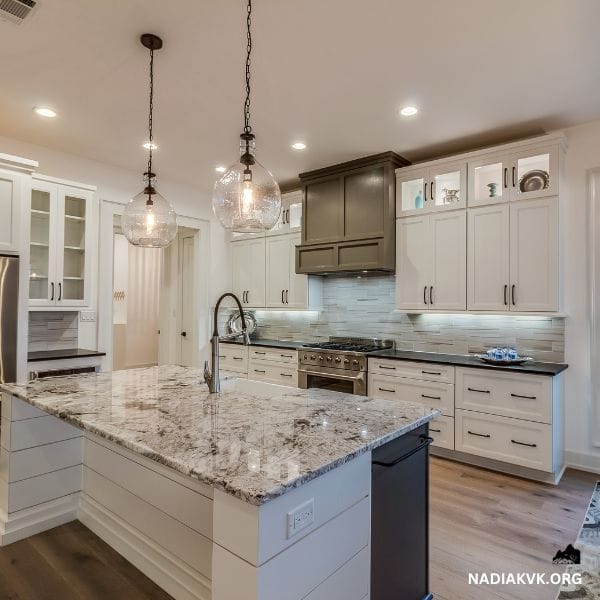There are several reasons why you shouldn’t stand or sit on your granite countertops. Countertops are an important part of every kitchen they provide a work surface for food preparation and cooking, as well as a place to set items down.
When selecting a countertop material, many homeowners mostly consider the aesthetic of the material, and how it will function in their kitchen. One of the popular choices for countertops is granite. Granite is a natural stone that is quarried in several parts of the world and you can easily find out granite in your near stores.

It is also available in many different patterns and colors. Mostly this question arises when considering granite countertops is whether it is ok to sit on your granite countertops.
The answer depends on many factors such as which type of granite is used in the countertop and what is the quality level of granite. Mostly in case standing or sitting on granite countertops can lead to surface cracks and chips.
The impact of your weight concentrated in one spot can create stress points that weaken the material over time. That cannot be repaired easily without professional help. Additionally, repeated pressure from standing or sitting may cause small fractures within the granite.

Here are three reasons why you shouldn’t stand or sit on your granite countertops.
Integrity
Maintaining the integrity of granite countertops should be a top priority. Granite is a hard material, but it is not made to support the weight and pressure of someone sitting or standing on it.
By doing so, you are taking the risk or compromising the countertop’s overall stability and allowing chips and cracks to develop over time.
The adhesive used to join the countertop pieces together is not as much as strong as the granite slab itself, even with the help of a skilled granite supplier and installer, making the seam-filled areas more at risk for damage.
It’s best to avoid using your granite countertop as a temporary seat or stand purpose if you want to save money on repair and keep it in good condition for a long time.
See Also: River White Granite Countertops
Hygiene
Standing or sitting on your granite countertops is not a good idea when it comes to hygiene. Although granite is a naturally durable and bacteria-resistant material, the act of standing or sitting on it can transfer germs and bacteria from your clothing or shoes onto the surface.
As bacteria can contaminate the food and possibly cause illness, this can be especially concerning if you’re preparing food on the countertop.
Standing or sitting on your granite countertops can also scratch or damage the surface, making it more challenging to clean and keep sanitized. The most effective strategy is to completely avoid standing or sitting on your granite countertops to ensure their durability and hygiene.
Read More: Verde Alpi
Flexibility
Your granite countertops should not be used for standing or sitting due to their lack of flexibility. Granite is a strong, and long-lasting material that can withstand pressure and intensive use. It is not, actually as flexible as other materials like wood or plastic items.
If you put too much weight on your granite countertops, it can cause stress on the countertop surface, leading to cracks, chips, or even breakage.
Granite is not resistant to changes in humidity or temperature. Extreme heat or cold can cause your countertop to expand or contract, which over time could result in cracks or other damage.
That’s why, it’s so important to place trivets or mats under hot pans and avoid placing heavy items on the countertop.
Your granite countertop can last longer if you take good care of it and don’t put too much pressure or weight on that it helps to extend its lifespan.
How Much Weight Can a Kitchen Countertop Hold?
If you’re considering the weight capacity of a kitchen countertop, it depends on the type of material used for construction.
At a height of around 36 inches, sudden loads of weight at one specific point should be avoided to prevent damage.
Granite is a popular choice for kitchen countertops because of its high durability and ability to withstand heavy loads. A granite countertop can hold up to 300 pounds of weight per square foot.
It is important to keep in mind that the weight capacity of a granite countertop depends on its thickness and quality level of granite. A thinner countertop will support less weight than a thicker one.
Another well-liked material for kitchen countertops is marble, which is also heat-resistant and elegant. But because it is softer than granite, it can support less weight. The load capacity of marble countertops is 150 pounds per square foot. The thickness of the countertop affects how much weight it can support, just like with granite.
Quartz is a relatively new material that is becoming increasingly popular for kitchen countertops due to its versatility and low maintenance requirements. Quartz countertops can hold up to 200 pounds of weight per square foot. However, the thickness of the countertop and the quality of the installation also affect the weight capacity of the countertop.
It is very important to keep in mind that kitchen countertops would not be able to withstand sudden weight loads at one particular location on the countertop.
It means while putting a heavy object slowly on your kitchen countertop won’t cause any harm, throwing a heavy object will undoubtedly cause some cracks.
However, you should not be worried about damaging or breaking your kitchen countertops with everyday use. Feel free to place heavy pots and pans on the counters, since your countertop can easily resist that weight.
Make Kitchen countertops to withstand the weight of multiple kitchen equipment like machines, but make sure you divide kitchen equipment weight across the entire slab of stone.
See Also: Granite Countertop Color
Conclusion
In conclusion, it is important to avoid standing or sitting on your granite countertops to ensure their longevity and aesthetic appeal. This may compromise their structural integrity, result in cracks and damage, and pose hygiene risks. By proper care of your countertops, you can enjoy their beauty and functionality for years to come.





